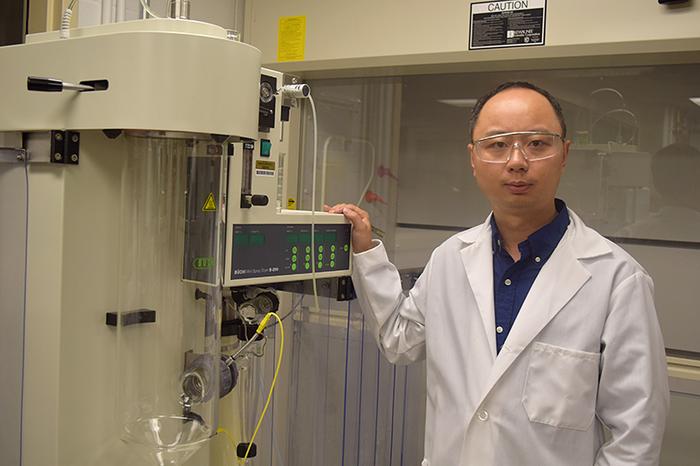Advertisment
Purdue pharmacy researcher receives $2.4 million NIH grant to fight antimicrobial-resistant lung infections

Qi “Tony” Zhou, a researcher in Purdue University’s College of Pharmacy has received a $2.4 million grant from the National Institutes of Health to fight lung infections that have established a resistance to antimicrobial drugs.
Zhou is an associate professor in the Department of Industrial and Molecular Pharmaceutics, a Faculty Scholar and a faculty member of the Purdue Institute for Drug Discovery and the Purdue Institute of Inflammation, Immunology and Infectious Disease. He leads a team of multinational experts from Australia, Thailand and the United States in developing novel, patent-pending inhalation therapeutics for lung infections.
“We are providing a promising option to fight the global crisis of antimicrobial resistance,” Zhou said. “The successful development of our invention could save tens of thousands of lives from a variety of deadly lung infections, including cystic fibrosis and ventilator-assisted pneumonia.”
Zhou’s research in antimicrobial resistance has yielded two U.S. patents, four patent applications and more than 70 publications in peer-reviewed journals. The most recent peer-reviewed journal publications were in Pharmaceutics in March 2024 and Pharmaceutical Research in August 2022.
With the latest NIH grant, Zhou has now received six federal grants totaling $10 million, including three NIH R01 grants in the past eight years to support the inhalation therapeutics research.
The threat of antimicrobial resistance
Thomas Sors, director of scientific strategy and relations at the Purdue Institute of Inflammation, Immunology and Infectious Disease, said antimicrobial resistance represents a severe global health threat as pathogens increasingly evade traditional treatments.
“The Centers for Disease Control and Prevention note that each year in the U.S., drug-resistant infections affect over 2.8 million individuals and result in more than 35,000 deaths, highlighting the urgent need for innovative strategies to address this crisis,” Sors said.
“According to the NIH, CDC and the Infectious Diseases Society of America, gram-negative ‘superbugs’ such as Klebsiella pneumoniae, Pseudomonas aeruginosa and Acinetobacter baumannii rank among the most dangerous multidrug-resistant microorganisms. Regrettably, the development of new antibiotics is lagging, and lung infections triggered by these resistant pathogens can be fatal.”
Developing inhalation therapeutics for the lungs
Zhou said oral or intravenous administrations of many antibiotics are often not effective for treatment of lung infections in many patients due to very limited drug exposure at the infection site and systemic toxicity.
“This makes lung infections caused by resistant bacteria extremely difficult to treat, reflected by the fact that lung infections are the fourth leading cause of death in the world,” Zhou said.
Zhou’s inhalation therapeutics help antibiotics directly reach the infection site in the lungs to better kill the bacteria. Inhaled medicines also can avoid systemic toxicity because much fewer drugs are absorbed into the bloodstream.
“We also use the innovative manufacturing techniques of advanced spray drying to incorporate two or more synergistic antibiotics into a single particle so they can deposit at the same site of infection and achieve the maximum bacterial killing synergy,” he said.
Next development steps
Preliminary animal studies showed superior bacterial killing capability and reduced toxicity of the new inhalation medicines.
Zhou said the team’s goal is to develop viable pharmaceutical products to effectively treat resistant bacterial lung infections. The NIH funding will be utilized to optimize the formulation and generate preclinical data for potential filing of a New Drug Application.
“Zhou’s cutting-edge research is a true breakthrough and perfectly exemplifies Purdue’s commitment to fight the global crisis of antimicrobial resistance,” said Eric Barker, the Jeannie and Jim Chaney Dean of Purdue’s College of Pharmacy.
Zhou disclosed the inventions of inhalation medicines to the Purdue Innovates Office of Technology Commercialization, which has applied for patents to protect the intellectual property. Industry partners interested in developing or commercializing the work should contact Joe Kasper, assistant director of business development and licensing — life sciences, at jrkasper@prf.org.
Writer/Media contact: Steve Martin, sgmartin@prf.org
Writer: Jenn Stewart-Burton, jsstewar@purdue.edu
Source: Tony Zhou, tonyzhou@purdue.edu
IMAGE: PURDUE UNIVERSITY’S QI “TONY” ZHOU LEADS A TEAM OF MULTINATIONAL EXPERTS TO DEVELOP NOVEL, PATENT-PENDING INHALATION THERAPEUTICS FOR LUNG INFECTIONS. HE RECEIVED A $2.4 MILLION GRANT FROM THE NATIONAL INSTITUTES OF HEALTH, AND THE RESEARCH WAS PUBLISHED IN THE MARCH 2024 ISSUE OF PHARMACEUTICS.
view more CREDIT: PHOTO PROVIDED BY TONY ZHOU





